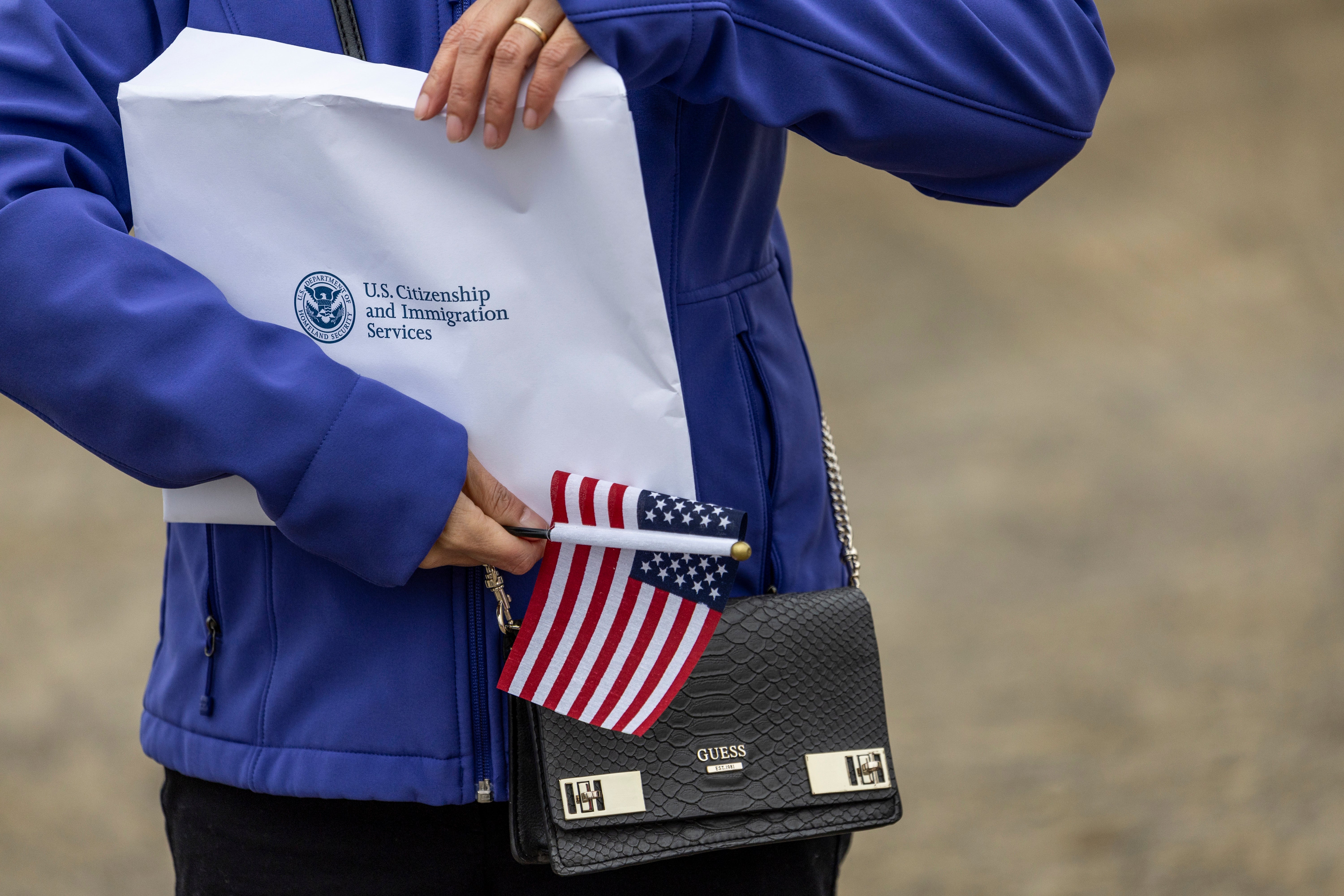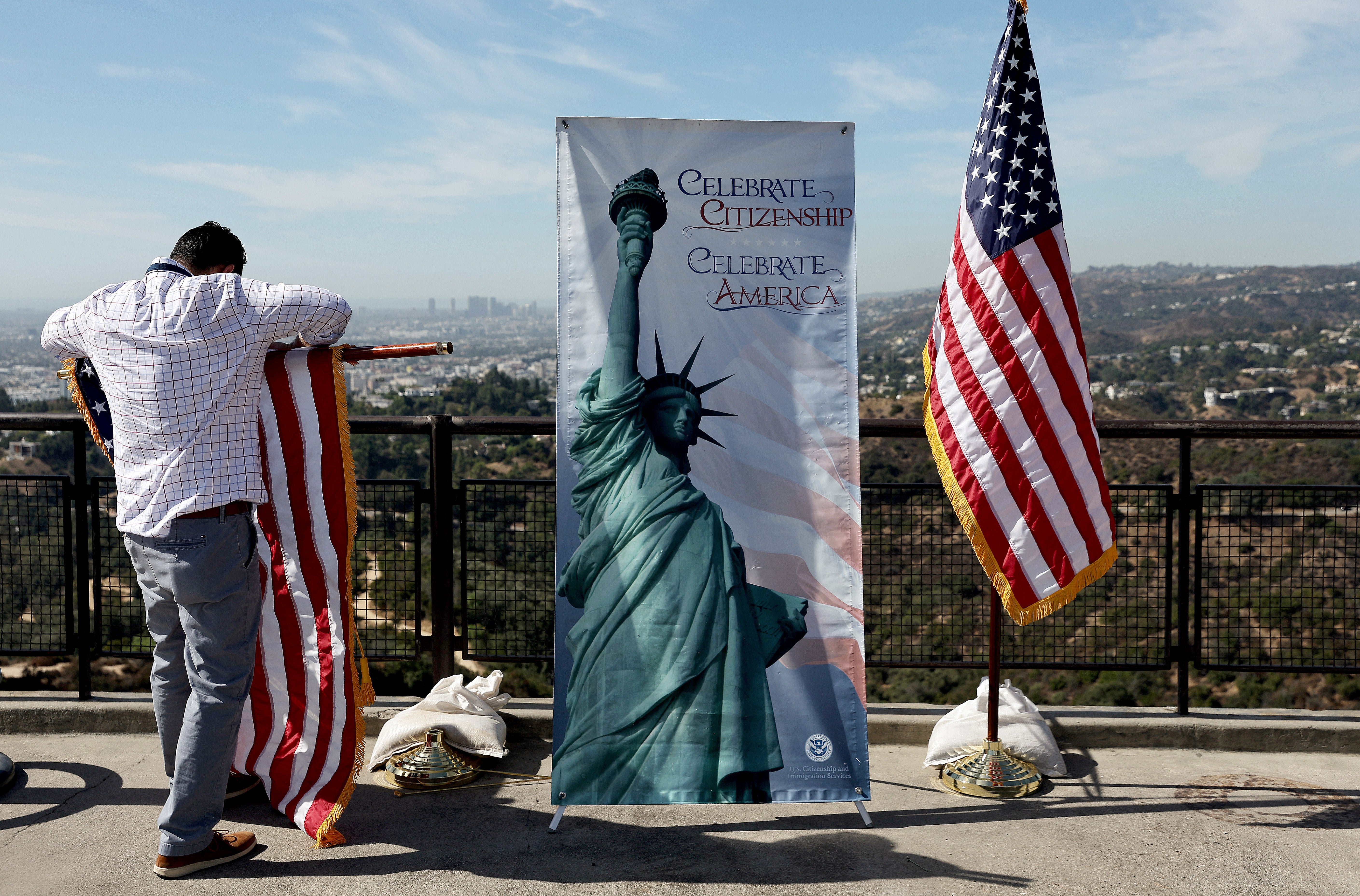Immigrants who are married to U.S. citizens have long expected that they won’t be deported from the country while going through the process of obtaining a green card.
But new guidance from Donald Trump’s administration explicitly states that immigrants seeking lawful residence through marriage can be deported, a policy that also applies to immigrants with pending requests.
Immigration authorities can begin removal proceedings for immigrants who lack legal status and applied to become a lawful permanent resident through a citizen spouse, according to guidance from U.S. Citizenship and Immigration Services issued this month.
The policy also applies to immigrants with pending green cards through other citizen family members.
People who entered the country illegally aren’t the only ones impacted. Under new guidance, immigrants trying to get lawful status through a spouse or family member are at risk of being deported if their visas expired, or if they are among the roughly 1 million immigrants whose temporary protected status was stripped from them under the Trump administration.

Immigrants and their spouses or family members who sponsor them “should be aware that a family-based petition accords no immigration status nor does it bar removal,” the policy states.
The changes were designed to “enhance benefit integrity and identify vetting and fraud concerns” and weed out what the agency calls “fraudulent, frivolous, or non-meritorious” applications, according to USCIS.
“This guidance will improve USCIS’ capacity to vet qualifying marriages and family relationships to ensure they are genuine, verifiable, and compliant with all applicable laws,” the agency said in a statement.
Those changes, which were filed on August 1, are “effective immediately,” according to the agency.
Within the first six months of 2025, immigrants and their family members filed more than 500,000 I-130 petitions, which are the first steps in the process of obtaining legal residency through a spouse or family member.
There are more than 2.4 million pending I-130 petitions, according to USCIS data. Nearly 2 million of those petitions have been pending for more than six months. It is unclear whether those petitions involve immigrants who either lost their legal status or did not have one at the time they filed their documents.
Previously, USCIS would notify applicants about missing documents or issue a denial notice serving as a warning that their case could be rejected — with opportunities for redress.
Now, USCIS is signaling that applicants can be immediately denied and ordered to immigrant courts instead.
Outside of being born in the country, family-based immigration remains the largest and most viable path to permanent residency, accounting for nearly half of all new green card holders each year, according to USCIS data.
“This is one of the most important avenues that people have to adjust to lawful permanent status in the United States,” Elora Mukherjee, director of the Immigrants’ Rights Clinic at Columbia Law School, told NBC News.
Under long-established USCIS policies, “no one expected” to be hauled into immigration court while seeking lawful status after a marriage, Mukherjee said. Now, deportation proceedings can begin “at any point in the process” under the broad scope of the rule changes, which could “instill fear in immigrant families, even those who are doing everything right,” according to Mukherjee.
Obtaining a green card does not guarantee protections against removal from the country.
The high-profile arrest and threat of removing Columbia University student Mahmoud Khalil put intense scrutiny on whether the administration lawfully targeted a lawful permanent resident for his constitutionally protected speech.
And last month, Customs and Border Protection put green card holders on notice, warning that the government “has the authority to revoke your green card if our laws are broken and abused.”
“In addition to immigration removal proceedings, lawful permanent residents presenting at a U.S. port of entry with previous criminal convictions may be subject to mandatory detention,” the agency said.

Another recent USCIS memo outlines the administration’s plans to revoke citizenship from children whose parents lack permanent lawful status as well as parents who are legally in the country, including visa holders, DACA recipients and people seeking asylum.
The policy appears to preempt court rulings surrounding the constitutionality of the president’s executive order that unilaterally redefines who gets to be a citizen in the country at birth.
That memo, from the agency’s Office of the Chief Counsel, acknowledges that federal court injunctions have blocked the government from taking away birthright citizenship.
But the agency “is preparing to implement” Trump’s executive order “in the event that it is permitted to go into effect,” according to July’s memo.
Children of immigrants who are “unlawfully present” will “no longer be U.S. citizens at birth,” the agency declared.
Trump’s order states that children whose parents are legally present in the country on student, work and tourist visas are not eligible for citizenship
USCIS, however, goes even further, outlining more than a dozen categories of immigrants whose children could lose citizenship at birth despite their parents living in the country with legal permission.
That list includes immigrants who are protected against deportation for humanitarian reasons and immigrants from countries with Temporary Protected Status, among others.
The 14th Amendment plainly states that “all persons born or naturalized in the United States, and subject to the jurisdiction thereof, are citizens of the United States and of the state wherein they reside.”
The Supreme Court has upheld that definition to apply to all children born within the United States for more than a century.
But under the terms of Trump’s order, children can be denied citizenship if a mother is undocumented or is temporarily legally in the country on a visa, and if the father isn’t a citizen or a lawful permanent resident.
More than 150,000 newborns would be denied citizenship every year under Trump’s order, according to plaintiffs challenging the president’s order.
A challenge over Trump’s birthright citizenship order at the Supreme Court did not resolve the critical 14th Amendment questions at stake. On Wednesday, government lawyers confirmed plans to “expeditiously” ask the Supreme Court “to settle the lawfulness” of his birthright citizenship order later this year.




